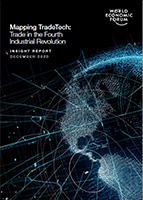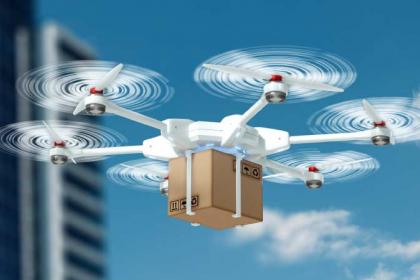
TradeTech is the set of technologies and innovations that enable global trade to be more efficient, inclusive and equitable. The interplay of technology and trade has a long history, spanning from advances in transportation to the advent of the container to the emergence of coordinated production networks.
This report considers modern TradeTech in two layers: (1) a first layer in which trade data and processes are transformed from analogue to digital; and (2) a second layer in which trade process optimization and synchronization occurs between different parties, and where emerging technologies play a key role. TradeTech solutions work in bundles. While the second layer depends on data generated in the first one, it is also hard to separate artificial intelligence (AI) from robotics or the internet of things (IoT) from 5G.
This report aims to shed light on the landscape of emerging trade technologies and consider the opportunities and challenges for each, with case studies used for illustration.1 Chapter 1 offers an overview of TradeTech and highlights seven current trends. These range from geopolitical considerations to the restructuring of the logistics market as a result of the adaption of emerging technologies to the role of TradeTech in supply chain resilience amid COVID-19.
Chapter 2 considers the application of major technology groups, describing the trade-related problems they purport to solve and implications for trade policy. Chapter 3 covers the major challenges for TradeTech adoption and suggests a way forward for solutions. Chapter 4 describes the potential that further TradeTech adoption could have for micro-, small and medium-sized enterprises (MSMEs) and developing countries, while Chapter 5 outlines key takeaways and next steps.
Digital technology, which is driving a fourth industrial revolution, is also reshaping international trade. It opens new windows of opportunity for many developing countries (LDCs) including the least developed countries to enhance their participation in world trade. It offers a useful tool for them to improve competitiveness and efficiency in trade, including through upgrading trade logistics and customs. At the same time, Tradetech cannot be deployed in the absence of good quality digital infrastructures, policy and regulatory frameworks and digital skills. This poses great challenges for developing countries and LDCs.
UNCTAD will continue providing technical cooperation programmes to developing countries and the LDCs to overcome these challenges. Our technical assistance and capacity-building programmes include customs-focused ASYCUDA, eTrade Readiness Assessments, and other support such as Science, Technology and Innovation Policy Reviews which aims at creating a favourable policy environment for development and adoption of technologies, including Tradetech.




